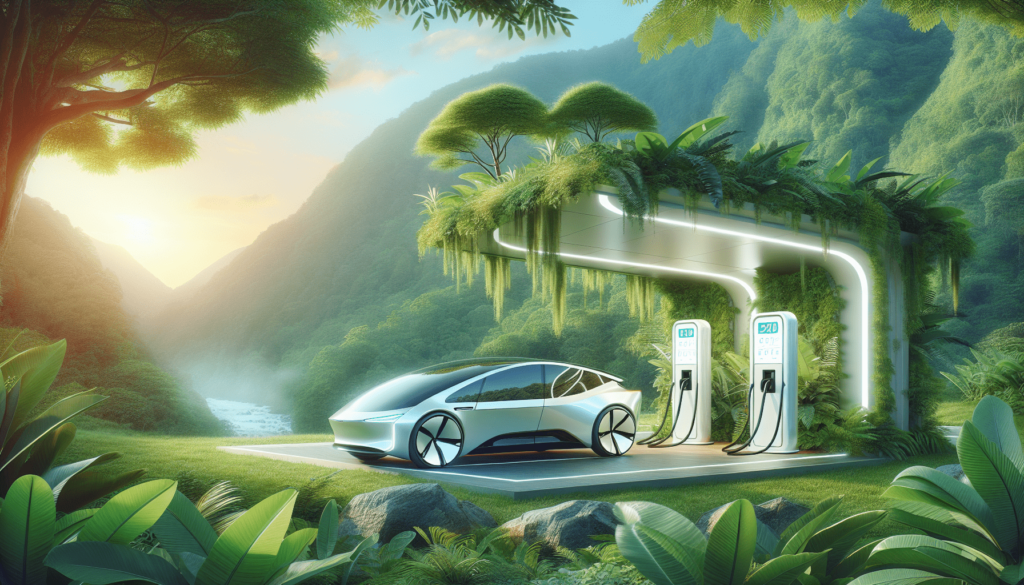If you’re considering purchasing an electric vehicle, you might be wondering about the incentives available to promote sustainability. It’s no secret that electric vehicles have gained popularity in recent years, with their environmentally-friendly nature and cost-saving potential. But what exactly are the incentives that make buying an electric vehicle even more appealing? In this article, we’ll explore the various incentives offered to encourage the adoption of electric vehicles, from government incentives to financial perks, and how they contribute to a greener and more sustainable future.

Government Incentives
Tax Credits
One major incentive for purchasing electric vehicles (EVs) is the availability of tax credits. Many governments around the world offer tax credits as a way to encourage individuals to choose electric vehicles over conventional gas-powered cars. These tax credits can significantly reduce the overall cost of purchasing an EV and make them more affordable for the average consumer. By reducing the financial barrier to entry, tax credits make it more enticing for individuals to make the switch to electric vehicles and contribute to a more sustainable future.
Rebates and Grants
In addition to tax credits, there are also various rebates and grants provided by governments to further incentivize the purchase of electric vehicles. These programs offer individuals financial incentives in the form of cash rebates or grants, which can help offset the initial cost of buying an EV. These rebates and grants can be a significant boost for prospective EV buyers, especially for those who may not be eligible for tax credits. With this additional financial support, more people are motivated to go electric, ultimately promoting sustainability efforts.
Exemptions and Discounts
Another way governments encourage the adoption of electric vehicles is through exemptions and discounts. Some cities or regions offer exemptions from certain taxes, such as sales tax or vehicle registration fees, for electric vehicle owners. Additionally, governments may provide discounts on tolls or express lane access for electric vehicle drivers. These exemptions and discounts not only make owning an EV more affordable but also provide tangible benefits that enhance the overall convenience and appeal of electric vehicles.
Incentives for Businesses
Governments recognize the critical role businesses play in transitioning to a more sustainable future, and therefore, they offer various incentives to encourage businesses to adopt electric vehicles. These incentives can include tax credits, grants, and other financial benefits specific to businesses. By providing incentives tailored to the needs of businesses, governments promote the widespread adoption of EVs in commercial fleets and contribute to a significant reduction in carbon emissions from transportation.
Infrastructure Support
Charging Station Installation Assistance
To address one of the concerns associated with electric vehicles – range anxiety – governments provide infrastructure support in the form of charging station installation assistance. Installing electric vehicle charging stations in public places, parking lots, and residential areas helps alleviate the fear of running out of battery power when driving longer distances. Governments often work with municipalities, businesses, and individuals to ensure the availability of an extensive and accessible charging network. By investing in the necessary infrastructure, governments demonstrate their commitment to supporting electric vehicle adoption and sustainable transportation options.
Access to High Occupancy Vehicle (HOV) Lanes
Another benefit of owning an electric vehicle is the ability to access high occupancy vehicle (HOV) lanes, even with just one occupant in the vehicle. These designated lanes are typically reserved for vehicles with multiple occupants, such as carpools or buses, allowing them to bypass traffic congestion. Granting electric vehicle owners access to these lanes incentivizes individuals to choose electric vehicles as a means to enjoy a more efficient and time-saving commute. By providing this privilege, governments not only promote electric vehicle adoption but also contribute to reducing overall traffic congestion and improving transportation efficiency.
Parking Benefits
Many governments and municipalities offer various parking benefits exclusively for electric vehicle owners. These benefits can include free or discounted parking rates for EVs in public parking garages, designated parking spaces with charging facilities, or extended parking durations in restricted zones. By offering parking incentives, governments not only make it more convenient for EV owners to find suitable parking spots but also encourage a higher uptake of electric vehicles, contributing to a cleaner and greener transportation landscape.
Reduced Operating Costs
Lower Fuel Expenses
One of the most significant advantages of owning an electric vehicle is the reduced operating cost in terms of fuel expenses. Compared to conventional gasoline or diesel-powered cars, electric vehicles can significantly lower the cost of transportation. Electricity is generally cheaper than fossil fuels, and charging an electric vehicle is considerably more cost-effective than filling up a gas tank. By leveraging electricity as the primary source of energy, EV owners can experience substantial savings in their monthly fuel expenses, making electric vehicles an attractive choice for budget-conscious consumers.
Maintenance and Repair Savings
Electric vehicles typically have fewer moving parts and a simpler drivetrain, which often leads to lower maintenance and repair costs. Unlike conventional vehicles, electric vehicles do not require oil changes, transmission checks, or regular replacement of engine components. This translates to long-term savings for EV owners. Additionally, electric vehicles are generally more reliable due to fewer mechanical components, reducing the likelihood of breakdowns and expensive repairs. With decreased maintenance requirements, EV owners can enjoy significant cost savings over the lifespan of their vehicles.
Environmental Benefits
Reduced Greenhouse Gas Emissions
One of the most significant environmental benefits of electric vehicles is the reduction in greenhouse gas emissions. While conventional gasoline-powered cars emit carbon dioxide and other pollutants into the atmosphere, electric vehicles produce zero tailpipe emissions. By driving an electric vehicle, you play a crucial role in reducing your carbon footprint and mitigating climate change impacts. Electric vehicles are an essential part of the transition toward a more sustainable and environmentally friendly transportation system, helping to preserve our planet for future generations.
Improved Air Quality
In addition to reducing greenhouse gas emissions, electric vehicles also contribute to improved air quality. Gas-powered vehicles emit various pollutants, including nitrogen oxides and particulate matter, which negatively impact air quality and human health. By transitioning to electric vehicles, we can greatly reduce these harmful emissions and improve the air quality in our cities. Cleaner air leads to better respiratory health for everyone, creating a healthier living environment for you, your family, and communities at large.

Long-Term Cost Savings
Resale Value
Electric vehicles tend to have higher resale values compared to their gasoline counterparts. This can provide long-term cost savings for electric vehicle owners, as they can recoup a larger portion of their initial investment when selling their EV. The growing demand for electric vehicles, coupled with increasing government support and incentives, contributes to this higher resale value. By choosing an electric vehicle, you not only save on operating costs but also have the potential to earn a higher return on your investment when it’s time to sell.
Longer Lifespan
Electric vehicles are known for their durability and longer lifespans compared to conventional cars. The simplicity of their drivetrains and the absence of internal combustion engines often result in reduced wear and tear on vital components. Additionally, the regenerative braking system used in electric vehicles helps extend the lifespan of brake pads and disks. With less frequent maintenance needs and components that are less prone to failure, EV owners can enjoy the benefits of a longer-lasting vehicle. This longevity contributes to long-term cost savings, as you won’t need to replace your vehicle as frequently as with traditional gasoline-powered cars.
Lower Dependence on Fossil Fuels
By choosing an electric vehicle, you reduce your dependence on fossil fuels and contribute to a more sustainable energy future. Electric vehicles rely on electricity as their primary source of energy, which can be generated from a variety of sources, including renewables like wind and solar power. This shift away from fossil fuels helps decrease our reliance on finite and polluting resources, promoting a cleaner and greener transport system.
Innovation and Technological Advancement
Encouraging Research and Development
The adoption of electric vehicles creates a demand for ongoing research and development in the field of electric vehicle technology. As more people embrace electric vehicles, manufacturers are pushed to innovate and improve their offerings. Governments often incentivize research and development efforts through funding programs and grants. By encouraging ongoing innovation, governments aim to drive further advancements in electric vehicle technology, such as improved battery performance, increased range, and faster charging times. This investment in research and development benefits consumers by continuously improving the overall electric vehicle ownership experience.
Driving Innovation in Battery Technology
One area where electric vehicles have seen significant advancements is in battery technology. Government incentives not only encourage the adoption of electric vehicles but also drive innovation in battery technology. The development of more efficient, longer-lasting, and faster-charging batteries is crucial for the widespread adoption of electric vehicles. Governments support initiatives and research aimed at enhancing battery technology, ultimately leading to more capable and affordable electric vehicles. This focus on battery technology innovation helps to address common concerns such as range anxiety and contributes to the overall growth and acceptance of electric vehicles.

Public Perception and Status Symbol
Sustainable Lifestyle Choice
Owning an electric vehicle is often seen as a sustainable lifestyle choice, reflecting a commitment to reducing one’s environmental impact. By choosing to drive an electric vehicle, you demonstrate a proactive approach to sustainability and contribute to positive change. The public perception of electric vehicle ownership has shifted from being a novel concept to a symbol of environmental consciousness. As electric vehicles become increasingly common, owning one can make a statement and align you with a community of like-minded individuals who prioritize sustainability and a greener future.
Positive Brand Image
For businesses, adopting electric vehicles can contribute to a positive brand image. In today’s conscious consumer market, many customers prefer to support companies that demonstrate environmental responsibility. By integrating electric vehicles into their fleet, businesses showcase their commitment to sustainability, which can result in increased customer loyalty and improved brand perception. Being seen as an environmentally conscious and forward-thinking company can give businesses a competitive edge in the market and attract a larger customer base that values sustainable practices.
Fostering Renewable Energy Transition
Grid Load Management
Electric vehicles have the potential to play a significant role in managing the electricity grid load. With smart charging technology, electric vehicle owners can charge their vehicles during off-peak hours when electricity demand is lower. This distribution of charging load helps balance the grid and reduces strain during peak electricity demand periods. By leveraging the flexibility of electric vehicle charging, governments can optimize the use of renewable energy sources and promote a smoother transition towards a cleaner and more sustainable energy grid.
Integration with Solar Energy
Electric vehicles can also be integrated with solar energy systems, further contributing to the renewable energy transition. By connecting your electric vehicle to a solar panel system, you can charge your car using clean, self-generated energy. This reduces your reliance on the traditional power grid, decreases greenhouse gas emissions, and maximizes the sustainability benefits of owning an electric vehicle. Governments, recognizing the potential synergy between electric vehicles and solar energy, often provide incentives and support for integrating these technologies, helping individuals embrace a more sustainable and energy-independent lifestyle.

Job Creation and Economic Growth
Stimulating Green Industries
The widespread adoption of electric vehicles stimulates the growth of green industries and creates job opportunities. The production, assembly, and maintenance of electric vehicles require a skilled workforce, driving the need for specialized jobs. Additionally, the development of charging infrastructure and renewable energy systems to support electric vehicles further contributes to job creation. Governments recognize the potential economic benefits of the green industry and often provide support, incentives, and funding to facilitate its growth. By promoting and investing in green industries, governments foster job creation and economic growth while simultaneously advancing sustainable mobility.
Workforce Development
The transition to a more sustainable transportation system also entails workforce development initiatives. Governments recognize the need for skilled workers to support the growing demand for electric vehicles. To ensure a smooth transition, governments invest in training programs and educational opportunities to equip individuals with the necessary skills and knowledge to work in the electric vehicle industry. By investing in workforce development, governments help individuals adapt to the changing job market, foster innovation, and sustain economic growth in the emerging green economy.
International Commitments and Climate Goals
Supporting Paris Agreement
Many countries have committed to the goals outlined in the Paris Agreement, which aims to combat climate change by limiting global warming to well below 2 degrees Celsius. The widespread adoption of electric vehicles aligns with the objectives of the Paris Agreement, as they significantly contribute to reducing greenhouse gas emissions from the transportation sector. By offering incentives for purchasing electric vehicles, governments demonstrate their commitment to meeting international climate goals and taking proactive steps to combat climate change.
Meeting Emission Reduction Targets
In addition to supporting the Paris Agreement, governments set their own emission reduction targets to combat climate change at the national level. The adoption of electric vehicles plays a critical role in achieving these targets, as transportation is one of the largest sources of greenhouse gas emissions. By incentivizing the purchase of electric vehicles, governments encourage individuals to choose a more sustainable mode of transportation, aiming to meet their emission reduction targets and create a cleaner and greener future for everyone.
In conclusion, the incentives for purchasing electric vehicles to promote sustainability are abundant and far-reaching. Government support, in the form of tax credits, rebates, and grants, makes electric vehicles more affordable and accessible to a wider range of individuals. Infrastructure support, such as charging station installation assistance and access to HOV lanes, addresses concerns related to range anxiety and traffic congestion. Reduced operating costs, environmental benefits, and long-term cost savings make electric vehicles an attractive choice for both individuals and businesses. Furthermore, the adoption of electric vehicles fosters innovation, contributes to public perception and positive brand image, and supports the transition to renewable energy. Additionally, the growth of electric vehicles stimulates job creation, economic growth, and helps governments meet their international climate commitments and emission reduction targets. With a comprehensive range of incentives, electric vehicles are poised to play a crucial role in promoting sustainability and shaping a greener and more sustainable future.


